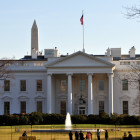This Is a Poem About What Causes Poems Like This to Be Written
|
Before I begin this poem ...
I'd like to ask you to join me in a moment of silence …
In honor of those who died in the World Trade Center and the Pentagon
On September 11th 2001 ...
Juvenile Justice Information Exchange (https://jjie.org/tag/white-house/)
Before I begin this poem ...
I'd like to ask you to join me in a moment of silence …
In honor of those who died in the World Trade Center and the Pentagon
On September 11th 2001 ...

Youth advocates have worked to reduce police involvement in school discipline
The National Council of Juvenile and Family Court Judges is voicing concern over the push to put armed police or guards into American schools following the Newtown school massacre of 20 first-graders and six staff last December. On Tuesday, the Reno, Nev.-based group posted an excerpt of a letter sent to Vice President Biden, who has been leading a month-long effort to gather ideas for more effective gun restrictions and improved school safety. The White House is reportedly poised to reveal some recommendations Wednesday at a midday press conference. In its letter to Biden, the NCJFCJ expressed strong misgivings about the prospect of communities putting armed guards in schools – which could become even more likely if federal dollars are offered to help schools make that choice. Published reports indicated Biden’s task force was considering such a plan, which has also been pushed by Sen. Barbara Boxer, a liberal Democrat from California.

Initiatives emerging from shootings may conflict with efforts to reduce police involvement in school discipline
As the White House considers proposals to allocate federal money for armed guards in schools, prominent school-discipline reform groups have issued a report denouncing the idea as a misguided reaction to the Newtown school shooting. “Placing more police in schools has significant and harmful unintended consequences for young people that must be considered before agreeing to any proposal that would increase the presence of law enforcement in schools,”says an issue brief released Friday by the Advancement Project, Dignity in Schools and other organizations. The Advancement Project, founded in 1999, has offices in Washington D.C. and California, and has worked with school districts and states to adopt alternatives to school suspensions and expulsions. Dignity in Schools is also devoted to working with school districts, advocating fewer school suspensions and less involvement of law enforcement in school discipline. The groups called on the White House and Congress, before they act, to consider how the school-discipline climate changed after more police were introduced to schools in response to the Columbine school shootings nearly 15 years ago in Colorado.

President Obama and First Lady Michelle will convene an anti-bullying conference at The White House, tomorrow, Thursday, March 10. The White House says the Conference on Bullying Prevention will include top officials from the Department of Education and Health and Human Services as well as students, parents, teachers and others who are trying to address the issue from across the nation. The conference will also include breakout sessions on proven policies that prevent bullying. The White House has been eager to engage a wider and younger audience on the issue, reaching out to people through social media. The president announced the conference on his Facebook page and has encouraged people to participate in the conference via live chats.

Juvenile Justice Programs across the nation could face $50 million in cuts outlined in the White House budget proposal. The Obama budget calls for “tough choices,” including a revamp of the way states must qualify for funding, based on how well they meet federal standards. Title II formula grants would come out of a $120 million fund called the Juvenile Justice System Incentive Grants. States would have to compete for rewards, based on how well they use evidence-based strategies, diversion programs and whether they reduce disproportionate minority contact (DMC). Youth Today digs into this new concept and how it might work. The President’s budget is a mix of cuts paired with some increases that could affect communities in different ways, according to thecrimereport.org. On the plus side, the Justice Department may get a 2% increase over all, including more money for the FBI, and $600 million for communities to hire first responder police officers.